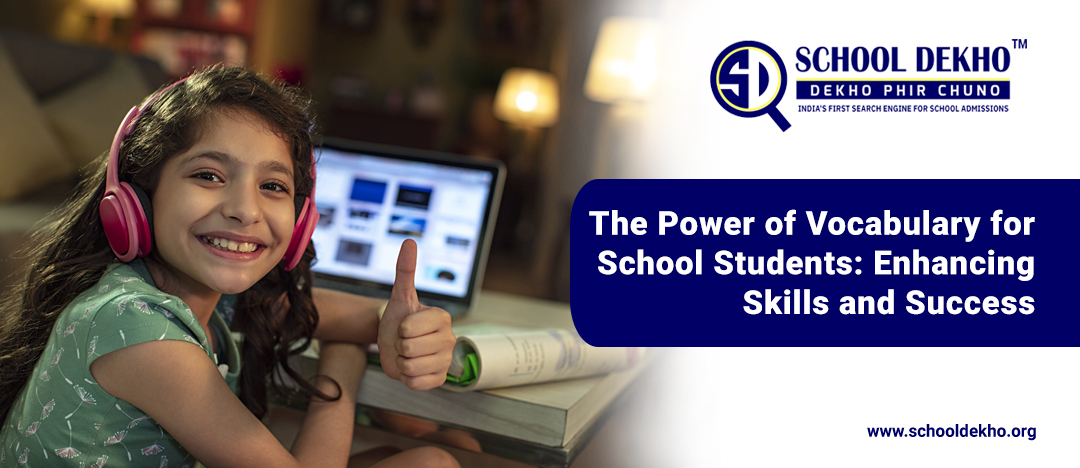
The Power of Vocabulary for School Students: Enhancing Skills and Success
Vocabulary plays a crucial role in the academic journey of school students. It not only helps them understand and express ideas effectively but also contributes to their overall academic success.
In this blog, we will explore why vocabulary is important for school students and provide some practical strategies to help them improve their vocabulary skills.
1. Comprehension and Academic Performance:
A strong vocabulary is directly linked to better reading comprehension. When students encounter unfamiliar words in textbooks or classroom discussions, a solid vocabulary foundation allows them to decipher meanings, grasp concepts, and follow complex instructions. As a result, their academic performance improves across subjects, including language arts, science, and social studies.
2. Writing Skills and Expression:
Vocabulary is the key to effective written expression. With an extensive lexicon, students can choose precise words to convey their thoughts and ideas, making their written assignments more coherent, persuasive, and impactful. A varied vocabulary helps students express themselves creatively and enhances their ability to communicate complex concepts in a clear and organized manner.
3. Critical Thinking and Analysis:
A rich vocabulary supports critical thinking skills by enabling students to analyze, evaluate, and interpret information more effectively. When students possess a broad range of words, they can better understand nuances, make connections, and draw accurate conclusions. This skill is especially important when reading and responding to literature, conducting research, or engaging in debates and discussions.
4. Confidence and Classroom Participation:
Having a strong vocabulary boosts students' confidence in expressing themselves verbally. They feel more comfortable actively participating in class discussions, asking questions, and sharing their ideas with peers and teachers. This not only improves their understanding of the subject matter but also fosters a positive classroom environment that encourages collaborative learning.
5. Expansion of Knowledge and Learning:
A diverse vocabulary enhances students' ability to learn independently. As they encounter new words in their readings, they can infer meanings, relate them to prior knowledge, and expand their overall understanding of the world. With an extensive lexicon, students can explore a wider range of texts, delve into complex subjects, and develop a lifelong love for learning.
Tips for Improving Vocabulary Skills:
- Reading Widely: Encourage students to read books, newspapers, magazines, and online articles across different genres. Exposing themselves to diverse vocabulary in context helps them understand word usage and build their own repertoire.
- Contextual Understanding: Encourage students to focus on understanding words through context rather than relying solely on dictionaries. Encourage them to decipher meanings from the surrounding sentences, helping them make connections and retain new vocabulary effectively.
- Word Games and Puzzles: Engage students in interactive activities such as word puzzles, crosswords, and vocabulary games. These engaging exercises make learning new words enjoyable and help reinforce their understanding of word meanings and usage.
- Vocabulary Journals: Encourage students to maintain personal vocabulary journals where they can record new words they come across, along with their meanings and sample sentences. Regularly reviewing these journals helps reinforce vocabulary retention.
- Word-of-the-Day Practice: Introduce a "word-of-the-day" practice in the classroom. Each day, students can learn a new word, discuss its meaning and usage, and try incorporating it into their conversations and written assignments.
- Word Associations and Synonyms: Encourage students to create word associations and explore synonyms and antonyms. This exercise helps them deepen their understanding of word relationships and expand their vocabulary.
Conclusion:
Vocabulary development is essential for school students as it enhances their comprehension, writing skills, critical thinking, and overall academic performance. By adopting strategies such as reading widely, using context clues, engaging in word games, maintaining vocabulary journals, and practicing word associations, students can actively improve their vocabulary skills.
Contact with Us
Call: 1800 - 2588 - 074
Mail: info@schooldekho.org
Student’s Best Education Portal | School Dekho | India's First School Search Engine | Best Schools Near Me | Find Schools Near me | Dekho Phir Chuno
#dekhophirchuno







Leave your thought here
Your email address will not be published. Required fields are marked *